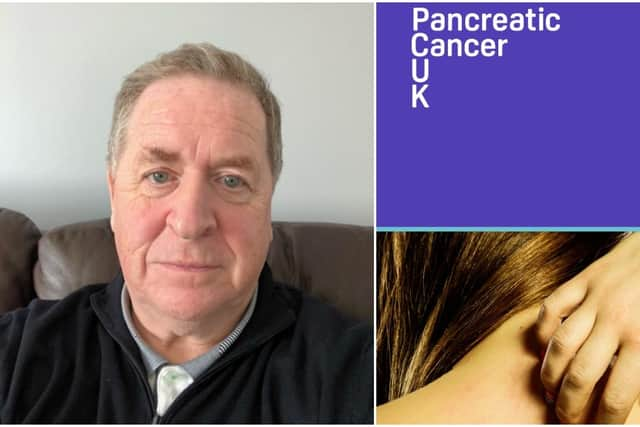'I turned yellow, like Homer Simpson' - Glasgow man who survived pancreatic cancer urges Scots to be alert for symptoms
It comes as an “extremely concerning” poll from Pancreatic Cancer UK found almost a quarter of people would wait three months or more before going to a GP with symptoms of the disease, at least three times longer than recommended.
The poll of more than 2,000 people also found respondents were put off by the pandemic, with 31 per cent saying they would delay seeking help for longer than usual.
Advertisement
Hide AdAdvertisement
Hide AdOf those less likely to seek help, half did not want to be a burden to the NHS, while a quarter were worried about catching Covid-19.


Pancreatic cancer has the lowest survival rate of any common cancer in the UK, and more than half of people die within three months of diagnosis.
Around 80 per cent of people are diagnosed when the cancer is at a late state and treatment is no longer possible.
Robert Slaven, from Glasgow, is a rare survivor of the condition.
He went to his GP with nausea, and when medication didn’t reduce his symptoms was referred to the Glasgow Royal Infirmary for tests, and diagnosed with pancreatic cancer in June 2020.
He is now recovering from an operation, and wants to raise awareness of the condition.
“I absolutely want to raise awareness about pancreatic cancer to help other people,” he said.
"I never thought something like this could happen to me in my life. I was quite lucky that my GP picked it up quite early. It is one of those really slow growing cancers and by the time you are diagnosed, it is often too late.”
Advertisement
Hide AdAdvertisement
Hide AdMr Slaven said he “could not believe it” when he was diagnosed with pancreatic cancer, after having been “not overly concerned” about his initial symptoms.
“My liver function was all over the place. But I was not overly concerned,” he said.
"I did not really think anything about it. I presented myself to the hospital, and ended up in there for five weeks. It was an absolute nightmare. By this time, I started to turn yellow. I looked like Homer Simpson. I had never had jaundice, so I had no idea how serious it was.”
Dawn Crosby of Pancreatic Cancer UK, said there is “no time to wait” with the disease.
"Thousands of people a year are told it’s too late, that nothing can be done for them,” she said.
"It is vital that people are diagnosed as early as possible to give them the best chance of having life-saving treatment.
“We do not want people to panic if they have some or all of these symptoms, because most people who do will not have pancreatic cancer. But it is absolutely vital that people learn more about this disease, talk to their loved ones and their GPs, and help us end the culture of silence around the deadliest common cancer in the UK.”
The most common symptoms of pancreatic cancer are back pain, indigestion, stomach pain and weight loss. Pancreatic Cancer UK advises that anyone experiencing these for more than four weeks should contact their GP, and anyone with jaundice (yellowing of the eyes or skin) should immediately go to A&E.
A message from the Editor:
Thank you for reading this article. We're more reliant on your support than ever as the shift in consumer habits brought about by coronavirus impacts our advertisers.
If you haven't already, please consider supporting our trusted, fact-checked journalism by taking out a digital subscription.
Comments
Want to join the conversation? Please or to comment on this article.
